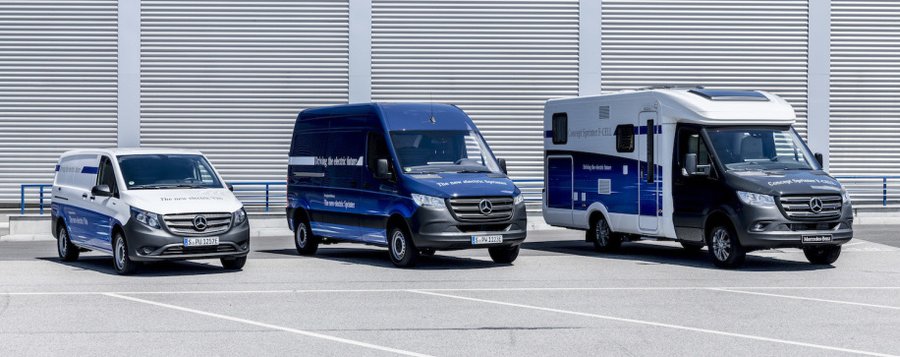Mercedes-Benz unveils zero-emissions electric vans, fuel-cell concept

Mercedes-Benz is further detailing plans for its electrified cargo vans, saying its battery-electric eVito will go on sale this fall, followed by the the larger eSprinter van in 2019. It's also debuting a concept fuel-cell version of the latter large van for longer-range applications.
The eVito is geared for urban delivery routes, tradespeople or service technicians and will be available in two wheelbase lengths — 202 inches or 211 inches, with maximum payloads of 2,365 pounds or 2,310 lbs, respectively, and cargo volume of between 19.7 and 21.7 cubic feet. With a 41 kilowatt-hour battery pack, it's good for 112 horsepower and 221 pound-feet of torque, with a top speed of 50 miles per hour or 75 mph, depending on how it's configured, around 150 kilometers (93 miles) of range and is fully chargeable in six hours. It goes on sale right after the IAA Commercial Vehicles show in Hannover in September, though the company's U.S. sales plans are unclear.
We recently wrote about the larger eSprinter, which comes to the market next year. It will come in two battery options — a 41 kWh battery with 71.5 miles of range, or a 55 kWh setup with 93 miles of range, fully charged in six or eight hours, respectively, or 80 percent charged in 45 minutes with a DC fast charger. Overall gross vehicle weight is 7,716 pounds, with payloads of 2,293 pounds and 1,984 pounds, respectively.
Mercedes is using a semi-integrated motorhome as the basis for its Concept Sprinter F-Cell, which combines fuel cell and battery technology in a plug-in hybrid configuration that boasts 197 hp and 258 lb-ft of torque. It boasts three tanks with a total capacity for 9.9 pounds of hydrogen and 186 miles of range, with the possibility of adding a fourth tank to the rear to extend range to 329 miles if needed, making the fuel-cell vehicle ideal for anything from urban deliveries to longer courier routes or inter-urban minibuses.
Mercedes-Benz says its eDrive@VANs strategy will help fleet owners electrify their fleets but also configure a total system solution, with advice on selecting the right cargo van, the eVan Ready mobile app and something called Customer Co-Creation, which includes a comprehensive appraisal and the joint development of solutions, from selecting a vehicle, to charging infrastructure and upgrading electrical networks. The company says the logistics company Hermes Germany is putting 100 of its electric vans into service, including an efficient charging infrastructure and software-controlled load management, while Amazon Logistics will have another 100 in use at locations in Bochum and Düsseldorf.
Digital services offered under the Mercedes PRO connect include servicing and maintenance management, plus analysis of driving style, communication between fleet managers and drivers, and mobile checks for ensuring that doors are locked and windows are closed. A new intelligent load management service allows for an overview of charge status of each van to ensure optimal use of charging infrastructure.
The company also plans to sell a smaller eCitan van sometime later on.
Related News
